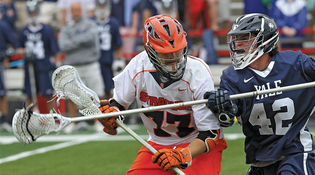 loading
loading
Sporting LifeSpring sports highlightsPostseason action for men’s lacrosse and women’s tennis. Alex Goldberger ’08 is an Olympics researcher at NBC.  Dick Blume/Syracuse Post-StandardYale captain Michael McCormack ’13 guards Henry Schoonmaker of Syracuse in the NCAA quarterfinals. View full imageMen’s LacrosseFor those who watched the Yale men’s hockey team’s stunning run to an NCAA title in April, it may not have been such a surprise to tune in a month later to the men’s lacrosse team playing No. 1 Syracuse in the NCAA quarterfinals—televised nationally on ESPN2—and see Yale ahead by two goals with just over three minutes to play. But by traditional standards, the situation was hard to fathom: the lacrosse team, which only recently returned to the Ivy League elite, was making just its fifth tournament appearance; Syracuse had won 11 national championships. Alas, the next Yale upset was not to be. Syracuse had watched Yale storm back from a 4–0 deficit—but then the Orange scored two goals in 44 seconds, and, with 13 seconds to go, added the game winner to escape with a 7–6 win. “It was a pretty similar theme to what we did all year,” says Bulldogs captain Michael McCormack ’13. “We fell down, and then it was a testament to our resiliency that we were able to come back. Credit Syracuse—they played great when they needed to.” The loss ended a superb season for the Bulldogs, who finished the year ranked No. 7 nationally after winning the Ivy League tournament for the second straight year and capturing their first NCAA tournament win since 1992. Individually, Brandon Mangan ’14—whose 64 points were the third most in Yale history—Dylan Levings ’14, and Peter Johnson ’13 received All-American honorable mentions, while Johnson and McCormack were Scholar All-Americans. After dropping their first two Ivy League games to Cornell and Princeton, the Bulldogs won nine of their next ten. The final victory, a comeback win over Penn State in the first round of the NCAA tournament, helped erase the memory of last season’s lopsided first-round loss to Notre Dame. “Last year, we were just happy that we had made the NCAA tournament,” McCormack says. “This year, we learned from our mistakes and headed into Penn State thinking that we couldn’t be complacent with where we were. That was a huge driving force in our success.” Women’s TennisSeven years ago, Yale handed the reins to the women’s tennis program to a 27-year-old with no head coaching experience—hoping to reinvigorate a team that had not won an Ivy League title in 17 years. Danielle McNamara, it turns out, was more than up to the task. This spring, her team won its third straight Ivy League championship, its fourth in six years. Along the way, McNamara has compiled a 42–7 career record in Ivy matches and, for the third straight year, went undefeated at home. A crop of individual standouts played a big part of that, chief among them Elizabeth Epstein ’13. The senior from Chicago capped her remarkable career by making her third All-Ivy team and becoming the first tennis player to win the Nellie Pratt Elliot Award, given to the top female athlete in the Yale senior class. “She’s done so well from her freshman year on,” McNamara says. “I know she’s really humbled by that award.” For the third straight year, Yale’s season included a trip to the NCAA tournament, where the team lost to Georgia Tech, 4–3, in the first round. The regular tournament appearances have McNamara now thinking well beyond Yale’s traditional rivals. “In terms of the Ivy League, our goal is to dominate the conference and separate ourselves from the pack as much as we can,” she says. “Our focus now is shifting to the national level and our goal of making it to the Sweet 16 at NCAAs.”
The comment period has expired.
|
|